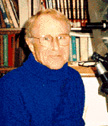The
University of Wisconsin (Madison)
Curator
|
|
Wally
Welker
was curator of the Mammalian Brain Collection at the University
of Wisconsin. He was Professor Emeritus in the Dept. of Physiology
(formerly the Dept. of Neurophysiology) at UW in Madison,
Wisconsin. He received his Ph D in The Psychology Dept.
of the University of Chicago in 1954; was a Postdoctoral
Fellow (NIH) at the Department
of Neurophysiology, joined the Faculty there in 1958
and formalized the collection of mammalian brain specimens
(see History ....).
|
Histologists
The
neurohistologists in the Department of Neurophysiology (now Physiology)
have played major roles in assuring the high quality of the embedding,
sectioning and staining of the brains ever since the neurohistology
lab was begun in 1950.
|
|
Helen
Brandemuehl (now deceased) established the initial
high standards for the laboratory, and trained most of
the technicians and students who have worked there. She
kept detailed protocols of procedures, routines and staining
recipes that have become standard practices for all subsequent
personnel in the Laboratory. |
|
|
Inge
Siggelkow (recently retired) was the manager and
Senior histologist of the Department of Physiology's neurohistology
laboratory. She has intimate knowledge of all procedures
used by her staff (Ms.'s Ekleberry and Meister, and with
them, carried out all the histological procedures that
were employed by her staff. She has had extensive experience
and training in neurohistological procedures, and can
be contacted by anyone who has questions about the procedures
and techniques that have been used in preparation of the
brain collections (inge@physiology.wisc.edu). Ms. Siggelkow
had access to all records of procedures used for every
specimen that exists in the Wisconsin Collection. She
regularly maintained the remaining specimens still at
Wisconsin. She actively worked with the National Museum's
staff in preparing and packing brain sections and other
material that have (and will be) transported to the National
Museum. She helped scan digital images of brain sections
from specimens that are being prepared and presented as
Web-displayed brain atlases for specimens deemed of interest
to researchers, students, and the public. |
|
|
Jo
Ann Ekleberry, Histologist, Univ. of Wis. (now
retired). Jo Ann was a devoted neurohistologist for over
26 years. She played a major role in all aspects of histological
processing of brain specimens in our normal brain collection.
She embedded brains involving celloidin, paraffin, frozen
and plastic media. She also sectioned brains and was active
in all subsequent histological processing activities,
including staining, mounting sections on glass slides,
cover-glassing the mounted sections, and adjusting the
saturation, color, degree of contrast of cells and fibers
to enhance visibility of neural features. She diligently
cleaned all the slide and then organized all the slide
boxes of each specimen and placed them in metal or wooden
slide boxes which were organized all slide boxes in shelves.
She also kept detailed records of all aspects about each
specimen. |
|
|
Joan
Meister, Histologist, Univ. of Wis. (now retired)
Joan was a devoted neurohistologist for over 20 years.
She played a major role in all aspects of histological
processing of brain specimens in our normal brain collection.
She embedded brains involving celloidin, paraffin, frozen
and plastic media. She also sectioned brains and was active
in all subsequent histological processing activities,
including staining, mounting sections on glass slides,
cover-glassing the mounted sections, and adjusting the
saturation, color, degree of contrast of cells and fibers
to enhance visibility of neural features. She diligently
cleaned all the slide and then organized all the slide
boxes of each specimen and placed them in metal or wooden
slide boxes which were organized all slide boxes in shelves.
She also kept detailed records of all aspects about each
specimen. |
Illustrator
and Photographer
|
|
Carol
Dizack, Senior Medical/Scientific Illustrator
and Graphic Designer, Univ. of Wisconsin. Has contributed
to all aspects of preparation of this Web Site. She has
arranged and manipulated images of all brains, brain sections,
as well as composed the illustrations which are placed
at the start of each section of this electronic document,
as well as others that are presented throughout the pages
of this site. Ms. Dizack has a Masters Degree in Fine
Art from the University of Wisconsin, as well as a Degree
in Commercial Art From the Madison Area Technological
College. She has been employed at the University of Wisconsin
for 40 years, and is currently a Senior Illustrator/Designer
in the department of Media Solutions in the University
of Wisconsin School of Medicine and Public Health. She
has been working with Wally Welker, John I. Johnson and
Photographer Terril P. Stewart in preparation of illustrative
materials associated with the University of Wisconsin
and the Michigan State University Comparative Mammalian
Brain Collections and for publications and our Web Site
since the beginning of her tenure at Wisconsin. She works
entirely with Macintosh computer-generated illustrations
and graphics. She is responsible for all aspects of the
illustrative composition of this Web site. She can be
reached at her e-mail address: cldizack@wisc.edu. |
|
|
Terrill
P. Stewart, Senior Photographer, Distinguished
Media Specialist, Univ. of Wisconsin. (now retired). was
responsible for all photographic activities for the Department
of Neurophysiology, as well as other Departments in the
University of Wisconsin School of Medicine and Public
Health. He took the photographs of all the brain specimens
and brain sections from the Wisconsin Comparative Mammalian
Brain Collection. All Photographs of brains presented
on this Web Site were photographed by Mr. Stewart. They
were taken by standard black and white photographic techniques
and colorized by Ms. Dizack using digital techniques.
The photographic archives of all images of animal specimens
(brain, body, and other) that comprise our brain collection
were prepared by Mr. Steward and all these will be transferred
to the National Museum when the remainder of the collection
specimens have been moved to Washington, D.C. |
Information
Technologists

Ray
Spiess, former Web Publisher, Univ. of Wisconsin |

Mary
Walsh, Web Designer, GreenLeaf MeDia |
|












